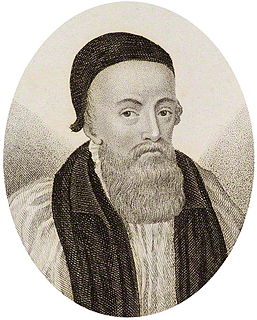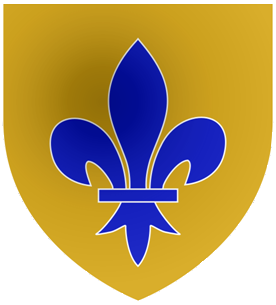Life
He was one of the divines sent in 1531 to confer and argue with Thomas Bilney, the reformer, in prison; and in 1535 he was sent by Henry VIII along with Richard Foxe, the royal almoner, and Thomas Bedyll, a clerk of the council, to Catherine of Aragon, now divorced by Henry, to try to persuade her not to use the title queen.
He was suffragan to the Bishop of Llandaff (titled Bishop of Penrydd (then spelled Penreth), after Penrydd in Pembrokeshire [6] and was then translated to become Bishop of Bangor. He then was appointed as the inaugural Bishop of Chester. The new diocese had both administrative and financial problems: Bird tried to address the finances, and dispensed with archdeacons, but succeeded only in making disadvantageous agreements with the Crown and with leaseholders. [7]
After the accession of the Catholic Queen Mary he was deprived of his bishopric on 16 March 1554 since he had married. [8] He at once repudiated his wife, and soon afterwards Edmund Bonner, Bishop of London, appointed him as his suffragan, and on 6 November 1554 presented him to the vicarage of Great Dunmow in Essex. [9]
Near the end of 1558, he died in an obscure condition and was buried in Chester Cathedral.

Cuthbert Tunstall was an English Scholastic, church leader, diplomat, administrator and royal adviser. He served as Prince-Bishop of Durham during the reigns of Henry VIII, Edward VI, Mary I and Elizabeth I.
Thomas Thirlby, was the first and only bishop of Westminster (1540–50), and afterwards successively bishop of Norwich (1550–54) and bishop of Ely (1554–59). While he acquiesced in the Henrician schism, with its rejection in principle of the Roman papacy, he remained otherwise loyal to the doctrine of the Roman Catholic Church during the English Reformation.
Thomas Watson was a Catholic Bishop, notable among Catholics for his descriptions of the Protestant Reformation. Historian Albert Pollard described Watson as "one of the chief Catholic controversialists" of Mary Tudor's reign.
Bishop Rowland Lee was an English clergyman who served as Bishop of Coventry and Lichfield 1534–43 and also as Lord President of the Marches under King Henry VIII.
John Scory was an English Dominican friar who later became a bishop in the Church of England.

Sir Thomas Goodrich was an English ecclesiastic and statesman who was Bishop of Ely from 1534 until his death.

John Vesey or Veysey (c.1462–1554) was Bishop of Exeter in Devon, from 1519 until his death in 1554, having been briefly deposed 1551-3 by King Edward VI for his opposition to the Reformation.

The Diocese of Chester is a Church of England diocese in the Province of York covering the pre-1974 county of Cheshire and therefore including the Wirral and parts of Stockport, Trafford and Tameside.

The Roman Catholic Diocese of Quilon is a diocese of the Latin Catholic Church in the Indian city of Kollam, and under the Ecclesiastical Province of Trivandrum. The diocese, which covers an area of 1,950 km2., and contains a population of 4,879,553 - 235,922 (4.8%) of which are Catholic. The history Latin catholic Church in Quilon begins with the erection of a diocese on 9 August 1329. This diocese was later suppressed. The present day Diocese of Quilon was established as a Apostolic Vicariate on 15 March 1853 by bifurcating the Apostolic Vicariate of Verapoly. It was elevated as a diocese on 1 September 1886.
Thomas Young was a Bishop of St David's and Archbishop of York (1561–1568).

The Suffragan Bishops Act 1534 is an Act of the Parliament of England that authorised the appointment of suffragan bishops in England and Wales. The tradition of appointing suffragans named after a town in the diocese other than the town the diocesan bishop is named after can be dated from this act.
Richard Sampson was an English clergyman and composer of sacred music, who was Anglican bishop of Chichester and subsequently of Coventry and Lichfield.

William Petow, O.F.M. was an English Franciscan friar and, briefly, a cardinal.
Ralph Baines or "Bayne" was the last Roman Catholic Bishop of Lichfield and Coventry, in England.

Sir William Portman was an English judge, politician and Chief Justice of the King's Bench. He was MP for Taunton in 1529 and 1536.

The Bishop of Penrydd was a suffragan see in the Church of England named in the Suffragan Bishops Act 1534.
Paul Bush was an English Augustinian and first bishop of Bristol of the new diocese.
William Chedsey (1510?-1574?) was an English Roman Catholic and academic, archdeacon of Middlesex in 1556 and President of Corpus Christi College, Oxford in 1558.

The Bishop of Bristol heads the Church of England Diocese of Bristol in the Province of Canterbury, in England.
The Bishop of Chester is the Ordinary of the Church of England Diocese of Chester in the Province of York.
This page is based on this
Wikipedia article Text is available under the
CC BY-SA 4.0 license; additional terms may apply.
Images, videos and audio are available under their respective licenses.










